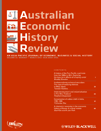
AUSTRALIAN ECONOMIC HISTORY REVIEW
Scope & Guideline
Fostering Scholarly Dialogue on Economic Evolution.
Introduction
Aims and Scopes
- Economic Development in Historical Context:
The journal focuses on analyzing the economic development trajectories of Australia and its neighboring regions, exploring how historical events, policies, and social structures have shaped modern economic landscapes. - Interdisciplinary Approaches:
By incorporating insights from sociology, political science, and cultural studies, the journal promotes a multifaceted understanding of economic history, examining how various factors interact to influence economic outcomes. - Global Perspectives:
The journal emphasizes the importance of situating Australian economic history within a global context, exploring connections and comparisons with other regions, particularly Asia, to provide a broader understanding of economic dynamics. - Historical Case Studies:
The publication features detailed case studies that investigate specific events, industries, or economic phenomena, providing in-depth analyses that contribute to the broader understanding of economic history. - Impact of Policy and Governance:
A key focus is on the role of government policies and institutional frameworks in shaping economic outcomes, highlighting how decisions made in the past continue to influence present-day economic conditions.
Trending and Emerging
- Gender and Economic History:
Emerging research increasingly examines the intersection of gender and economic history, exploring how gender roles and relations have shaped economic development and labor dynamics in historical contexts. - Environmental and Agricultural Economics:
A growing focus on environmental factors and their influence on economic histories is evident, with studies investigating the impacts of climate, agriculture, and resource management on economic development. - Migration and Labor History:
The theme of migration, particularly in relation to labor supply and economic growth, has gained prominence, reflecting contemporary discussions on migration policy and its historical roots. - Institutional Economics:
There is an increasing emphasis on the role of institutions in shaping economic outcomes, with research exploring how institutional changes have influenced economic trajectories over time. - Globalization and Economic Networks:
Recent publications highlight the effects of globalization and international economic networks, examining how these factors have historically impacted local economies, trade, and labor markets.
Declining or Waning
- Traditional Economic Models:
There is a noticeable decline in the application of traditional economic models that do not incorporate social and cultural dimensions, as researchers increasingly favor more holistic and interdisciplinary approaches. - Focus on Purely Quantitative Analysis:
The journal has seen a reduction in papers that rely solely on quantitative data analysis without contextual historical insights, as scholars now emphasize the importance of qualitative narratives alongside quantitative evidence. - Colonial Economic History:
While still a relevant theme, the focus on colonial economic history has slightly diminished, possibly due to a growing interest in post-colonial studies and the impacts of colonial legacies rather than the colonial period itself. - Narrowly Defined Regional Studies:
There is a shift away from studies that focus exclusively on very localized economic histories without broader regional or global contexts, as researchers seek to place local events within larger narratives. - Historical Commodity Analysis:
Research specifically centered on the analysis of single commodity histories (e.g., specific agricultural products) is becoming less frequent, as there is a trend towards broader thematic explorations that encompass multiple commodities and their interconnections.
Similar Journals

Lietuvos istorijos studijos
Exploring the Depths of Lithuanian HeritageLietuvos istorijos studijos is a prominent open access journal devoted to the multifaceted exploration of Lithuanian history and its broader implications in the context of global historical narratives. Published by Vilnius University Press, this journal has been fostering scholarly communication in its field since 2013, making a significant contribution to the advancement of historical research in Lithuania. With a focus on innovative historical methodologies and interdisciplinary approaches, Lietuvos istorijos studijos serves as a crucial platform for researchers, professionals, and students who are keen to engage with both primary and secondary sources pertaining to the diverse tapestry of Lithuanian heritage. The journal operates under the ISSN 1392-0448 and E-ISSN 1648-9101 and has been classified in the Q4 category in History for 2023, indicating a growing interest and engagement within the academic community. The ongoing convergence of historical studies from 2022 through 2024 further highlights its commitment to evolving research trends. Interested readers can access the journal freely, making it a vital resource for anyone seeking to deepen their understanding of Lithuania's historical landscape.

Economic History of Developing Regions
Bridging Historical Contexts with Contemporary Economic Strategies.Economic History of Developing Regions, published by Routledge Journals, Taylor & Francis Ltd, is a distinguished academic journal that focuses on the intersection of economic development and historical analysis in emerging economies. Established in 2010, this journal serves as a vital platform for researchers, professionals, and students interested in understanding the economic dynamics and historical contexts that shape developing regions. With its impressive ranking in the Q1 category in History and Q3 in both Development and Economics, it has established itself as a credible source for innovative research and critical insights. Despite being a non-open access publication, it consistently aims to bridge the gap between historical understanding and economic strategies, making it essential reading for those engaged in the studies of economics, history, and development. Emphasizing rigorous academic standards, the journal highlights quality scholarship that contributes to the discourse on sustainable development and policy frameworks essential for evolving economies.

History of Economic Thought and Policy
Cultivating Knowledge at the Intersection of History and EconomicsHistory of Economic Thought and Policy is a vital journal published by FRANCO ANGELI, dedicated to exploring the intersections of economic theory, historical context, and public policy. With ISSN 2240-9971 and E-ISSN 2280-188X, this journal serves as an essential platform for scholars interested in the evolution of economic ideas and their implications for contemporary policy-making. Operating from Italy, it has established a comprehensive framework for interdisciplinary research in the fields of Economics and Econometrics, History, and Public Administration, although it currently holds a Q4 ranking in these categories according to 2023 metrics. The journal already encompasses multiple converging years from 2018 to 2024, underscoring its commitment to timely contributions to economic discourse. It aims to provide open access to its content, fostering a collaborative environment for researchers, professionals, and students keen on enhancing their understanding of economic thought throughout history. Despite its current challenges in Scopus rankings, with notable positions in arts, humanities, and social sciences, History of Economic Thought and Policy remains a promising outlet for significant and critical discussions surrounding the historical pathways that shape today’s economic policies.
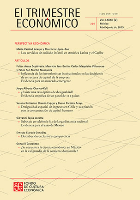
TRIMESTRE ECONOMICO
Catalyzing Collaboration in Economic Research and Policy.TRIMESTRE ECONOMICO, published by FONDO CULTURA ECONOMICA, is a prominent open access journal in the field of Economics and Econometrics based in Mexico. Since its inception in 1979, this journal has served as a critical platform for disseminating scholarly research and theoretical advancements within economic sciences, addressing both contemporary issues and historical perspectives. With an impact factor that ranks it within the Q3 category among 716 journals in its field, TRIMESTRE ECONOMICO continues to contribute significantly to the academic community, providing readers with insights into economic modeling, policy analysis, and empirical research. The journal has embraced open access since 2011, fostering a broad reach and encouraging innovation and collaboration among researchers, professionals, and students. It is essential reading for those seeking to deepen their understanding of economic trends and theories, making valuable contributions to both local and global discussions.

Revista Uruguaya de Historia Economica
Bridging Historical Perspectives with Contemporary Economic IssuesRevista Uruguaya de Historia Economica is a premier academic journal dedicated to exploring the multifaceted aspects of economic history in Uruguay and Latin America. Published by the ASOC URUGUAYA HISTORIA ECONOMICA, this journal aims to serve as a vital platform for researchers, scholars, and practitioners seeking to understand the evolution of economic policies, practices, and theories within a historical context. With an ISSN of 1688-8561, the journal highlights rigorously peer-reviewed articles that enhance the discourse in economic history and related fields. Although it does not offer open access, the Revista Uruguaya de Historia Economica is pivotal for those aiming to broaden their knowledge and scholarly engagement in Latin American economies. With its profound commitment to advancing economic historical research, the journal positions itself as an essential resource for academics and professionals alike, stimulating both local and international discourse.
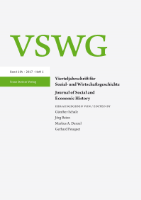
VSWG-Vierteljahrschrift fur Sozial-und Wirtschaftsgeschichte
Exploring the Intersections of Society and EconomyVSWG - Vierteljahrschrift für Sozial- und Wirtschaftsgeschichte is a distinguished academic journal published by Franz Steiner Verlag GmbH in Germany, focusing on the interdisciplinary fields of social and economic history. With an ISSN and E-ISSN of 0340-8728, this journal serves as a vital resource for scholars, researchers, and students interested in the complexities of socio-economic transformations across historical contexts. While it currently does not offer open access, its contributions are significant in raising critical discussions within cultural studies and economic history, as evidenced by its Q3 and Q4 rankings in various categories, including Cultural Studies and Sociology. Although the Scopus rankings reflect competitive standings, the journal continues to provide meaningful discourse and insights, supporting academic endeavors in an increasingly interconnected world.
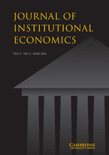
Journal of Institutional Economics
Bridging Economics and Institutional TheoryJournal of Institutional Economics, published by Cambridge University Press, stands as a premier forum for the dissemination of research at the intersection of economics, institutions, and governance. With an ISSN of 1744-1374 and E-ISSN 1744-1382, this journal has established itself as a vital resource within the academic community, achieving an impressive Q1 ranking in the field of Economics, Econometrics and Finance as of 2023. The journal's focus on institutional analysis not only enhances our understanding of economic phenomena but also fosters interdisciplinary dialogue among scholars and practitioners alike. With a commendable rank of 39 out of 288 in Scopus rankings, placing it in the 86th percentile, the Journal of Institutional Economics provides access to groundbreaking research that holds significant implications for policy and decision-making. Researchers, professionals, and students engaged in the study of economic systems will find this journal an invaluable addition to their academic resources.

Iberian Journal of the History of Economic Thought
Charting the Course of Economic Thought in IberiaThe Iberian Journal of the History of Economic Thought, published by Ediciones Complutense, serves as a pivotal platform for the dissemination of scholarly research related to the history of economic ideas in the Iberian context. With its Open Access model established since 2014, this journal aims to enhance visibility and accessibility of research findings, making valuable contributions to the field for researchers, professionals, and students alike. Although currently lacking a quantified impact factor, the journal's dedication to rigorous academic standards ensures that it continues to attract high-quality submissions that reflect contemporary discussions in economic thought. Located in the vibrant academic hub of Madrid, Spain, the journal seeks to explore the rich tapestry of economic theories and practices that have emerged across the Iberian Peninsula, offering a crucial resource for those interested in the historical development of economic concepts and their relevance today. Whether you are seeking to publish your research or delve into the rich archives of past economic theories, the Iberian Journal of the History of Economic Thought stands out as an essential resource in the evolving landscape of economic scholarship.
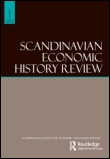
SCANDINAVIAN ECONOMIC HISTORY REVIEW
Bridging Disciplines to Illuminate Economic HistorySCANDINAVIAN ECONOMIC HISTORY REVIEW, published by ROUTLEDGE JOURNALS, TAYLOR & FRANCIS LTD, stands as a significant scholarly platform dedicated to the exploration and analysis of economic history within the Scandinavian context. With an ISSN of 0358-5522 and an E-ISSN of 1750-2837, this journal has been publishing high-quality research since 1953 and continues its contribution to academia with a projected publication span extending to 2024. Renowned for its rigorous scholarship, the journal enjoys a commendable standing in the academic community, reflected in its Q1 classification in History and its competitive rankings across multiple categories. The journal particularly champions transdisciplinary approaches, encouraging researchers to engage with economic history through various lenses including the arts, humanities, and social sciences. Despite operating on a traditional access model, the impactful content delivered within its pages offers invaluable insights for researchers, professionals, and students striving to deepen their understanding of the economic transformations in Scandinavian societies.
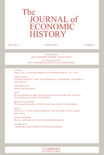
JOURNAL OF ECONOMIC HISTORY
Advancing Knowledge Through Economic NarrativesJOURNAL OF ECONOMIC HISTORY, published by Cambridge University Press, is a renowned academic platform dedicated to the exploration and analysis of economic history from its inception in 1941 through the forthcoming decades. With its ISSN 0022-0507 and e-ISSN 1471-6372, this journal occupies a prestigious place in the field, as evidenced by its impressive Q1 rankings in both Economics and Econometrics and History categories for 2023. It is positioned among the top tier of journals, ranking #42 out of 1760 in the Arts and Humanities (History) and #75 out of 242 in Economics, Econometrics, and Finance (Miscellaneous) according to Scopus metrics. The journal's rigorous peer-reviewed articles aim to bridge theoretical frameworks with empirical research, fostering an understanding of historical economic dynamics and their relevance in contemporary society. Although the journal does not offer open access, it continues to serve as an essential resource for researchers, professionals, and students aiming to deepen their knowledge and contribute to critical discussions within the fields of economics and history. The journal publishes diverse articles that engage critically with both primary and secondary sources, ensuring that its contributions remain impactful and influential within the academic community.